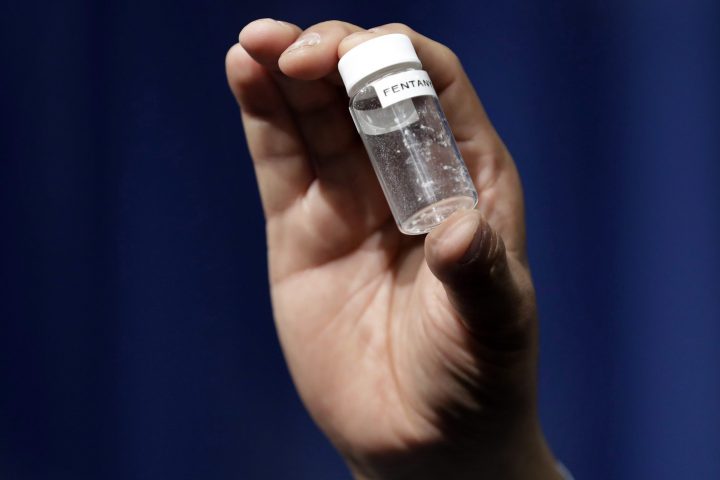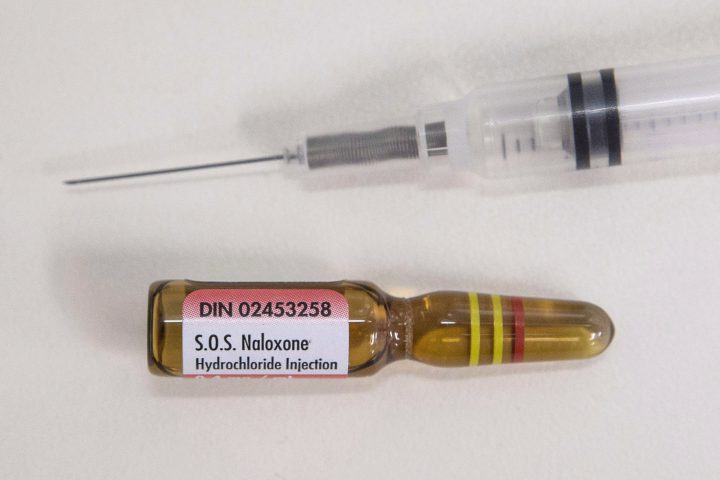The effects of fentanyl have been devastating across Canada, with the opioid crisis claiming 935 lives in British Columbia alone last year.

Deaths caused by the drug — which is 50 to 100 times more potent than morphine — have spurred a public health emergency in some provinces, with other regions deploying new opioid overdose strategies.
Even with the emergency planning, it seems the crisis will be tough to beat. B.C. is expected to hit 1,500 overdose deaths by the end of this year.
READ MORE: Spate of drug overdoses in Toronto wakeup call, experts say
In Toronto, the deaths of four people and more than 20 reported overdoses between Thursday and Sunday prompted police to issue a public alert. The city’s Mayor John Tory spoke out on the issue Sunday.
“Every one of these overdoses is a tragedy and each loss of a life has a devastating impact on families, friends and the community as a whole,” he said.
WATCH: Police say recent overdose deaths in downtown Toronto may be linked to fentanyl-laced drugs

How does fentanyl work and what are the symptoms?
Fentanyl, much like other opioids such as heroin and morphine, impacts the area of the brain responsible for controlling pain and emotions, according to the U.S. National Institute on Drug Abuse. The drug binds opioid receptors, increasing dopamine levels. The increase in dopamine results in a state of relaxation and euphoria.
READ MORE: Survivors of fentanyl overdoses often suffer devastating brain damage
The drug is meant to treat chronic pain in a controlled setting, and in limited quantities. However, it has been increasingly available illegally, and often looks much like prescription medication, the RCMP warns.
Someone who has used fentanyl will experience effects such as nausea, drowsiness and confusion. More seriously, the drug can lead to addiction, cardiac arrest, unconsciousness, coma and even death.
How are the effects of fentanyl reversed?
Dr. Hance Clarke, a clinical researcher at Toronto General Hospital, says the window to reverse a fentanyl overdose is very short.
If those who experience an overdose are lucky, they’ll receive naloxone, a fentanyl “antagonist,” Clarke says. First responders across the country are beginning to carry naloxone kits, which often include a nasal spray and injections that help restore breathing.
While naloxone “quite often” leads to a full recovery, if it’s not available, Clarke says CPR should be done to keep the heart beating and prevent cardiac arrest.
During an overdose, the brain will become deprived of oxygen, or anoxic, in about five minutes, which is when long-term health complications arise, Clarke explains.
WATCH: Nova Scotia opioid use, overdose framework includes free naloxone access

READ MORE: Experts sound alarm after 40% increase of fentanyl-laced street drugs tested in Canada
What happens after someone survives an overdose?
Regardless of whether someone who has overdosed is treated with naloxone or not, they must go to the hospital immediately, the RCMP’s website explains.
But there is a greater risk for those who haven’t received the antidote. Cardiac arrest can have several “residual effects,” according to Clarke. These can range from broken ribs (due to CPR), temporary or permanent paralysis, brain damage, or lead to the person becoming brain dead.
WATCH: Alberta declares fentanyl problem a public health crisis

There are several mental health effects, as well.
“If you’re using fentanyl, you likely already have mental health issues to begin with,” Clarke explains.
“The best thing that you can hope for, someone who has had a near-death experience, is that they think maybe I should do things differently moving forward and seek treatment options.”
Clarke adds that with new funding and opioid overdose strategies, it is easier for those who are battling addiction to seek help, and proper medical attention.
— With files from The Canadian Press





Comments